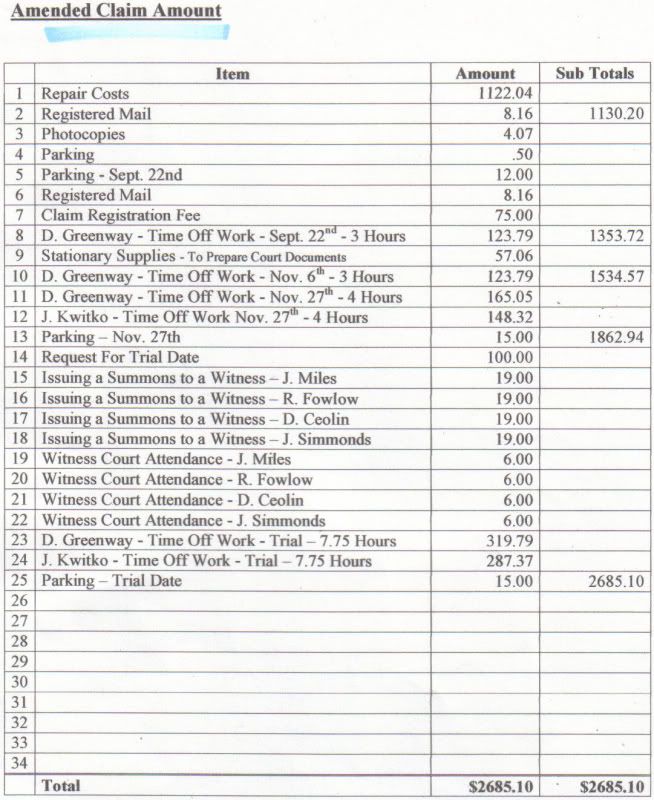If you are serious about making an 11b challenge on your own, I suggest you first start by reading the ruling in the R. v. Morin case. Also, there is an 11b decision digest available on Canlii that is also fairly helpful.
The first step is to file a Notice of Constitutional Question, or Form 4f, with the crown prosecutor, The Attorney General of Ontario, and the Attorney General of Canada. This lets the court know that you intend to dispute the charge with a charter claim. Again, if mailing the forms, use registered mail. The most economical route is if you own a fax machine. Here are two examples of a sample form:
Sample form from government website
Sample from FYST
You should ideally start your 11b charter challenge as soon as you are made aware of the violation of your rights. I would usually wait until disclosure is obtained, but this is not strictly necessary. In the event that the prosecution refuses to provide disclosure, or does not provide you with disclosure in a timely manner, you can use this as additional 'ammunition' in your 11b challenge. However, you should not leave the challenge until the last minute. Failure to do so can be constrewed as an implicit acceptance of the pace at which things are happening (Number 4 in the list in section 2.2.1). E.g.: You didn't say anything before your trial date, so you are implicitly agreeing that the time taken to bring your case to court is acceptable to you. Similarly, if you do not actively pursue the prosecution for your disclosure, your complacency can be seen in the same way. In any event, you must file these forms no later 15 days before your court date.
Once you have filed these forms, You may be contacted by the Prosecutor's office to have your court date moved forward. This is rare, as the courts are usually quite backed up, but in the 'unlucky' event that this happens to you, you will pretty much have to abandon your 11b challenge, unless disclosure still has not been provided.
At your court date, before court is in session, you should tell the prosecutor that you intend to make your 11b challenge. Sometimes, they will acquiesce, and you will be off the hook. Other times, they may fight you tooth and nail. Once court is in session and you are called, you must immediately motion for a stay of proceedings based on your section 11b charter rights (and explain why you feel your section 11b rights have been violated). You must make this motion pre-plea (i.e.: before you have plead guilty/not-guilty). If your motion is accepted, the justice will enter a 'stay of proceedings' based on a violation of your charter rights (you are off the hook). If your motion is denied, you will have to proceed to trial, so be ready.
Also, please note that generally speaking, making an 11b challenge and accepting a plea-bargain are mutually exclusive. If your charter challenge fails, you will not be able to plea-bargain, and you must then make a plea of either guilty (accept the ticket at face value) or not-guilty (proceed to trial immediately).
Making an 11b challenge if you filed all the paperwork
If you successfully filed all your paperwork for your 11b challenge, then you should inform the prosecutor that you intend to make an 11b motion. In some cases, if they feel your motion is very likely to succeed, they may just back down and drop the charges. Otherwise, wait until court has started. When you are called up to the stand, you will say your name for the court reporter, and then you will make your 11b motion pre-plea. See section 2.2.2 for more details.
Making an 11b challenge if you didn't file all the paperwork
If you didn't file any of the paperwork, you can still make an 11b challenge. However, you will have to ask for an adjournment to do so. Double check to make sure your witness is actually present (if the witness is not present, you could just proceed to trial and have your charge dropped). Tell the prosecutor that you intend to ask for an adjournment to file the paperwork necessary to make an 11b challenge. When you are called up, make your motion for an adjournment pre-plea. Explain that you failed to file the appropriate paperwork, and would like an adjournment to do so. Note that you will be basing the time period for your 11b challenge from the date of the offence to the first trial date. The time period from the first trial date to the second trial date will not count against your 11b rights, since you are the one who has caused the delay.
I have highlighted one line. How this is going to work in our case as we already have plead guilty?
